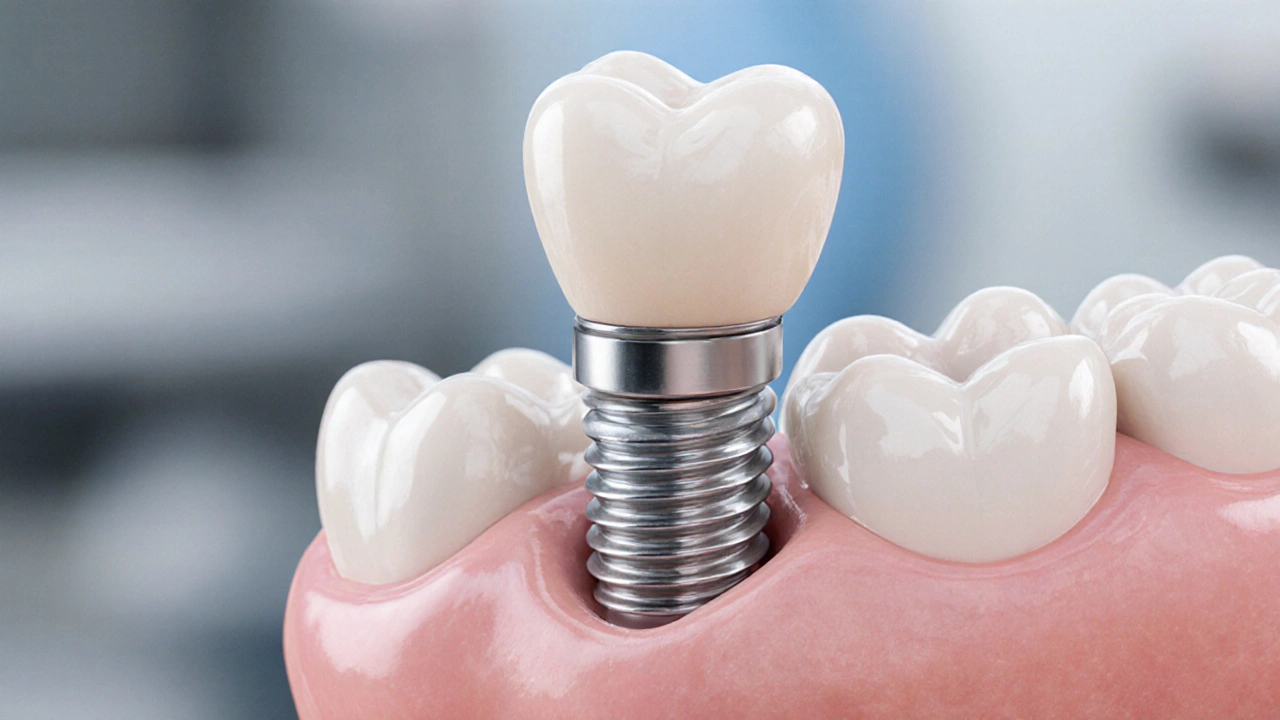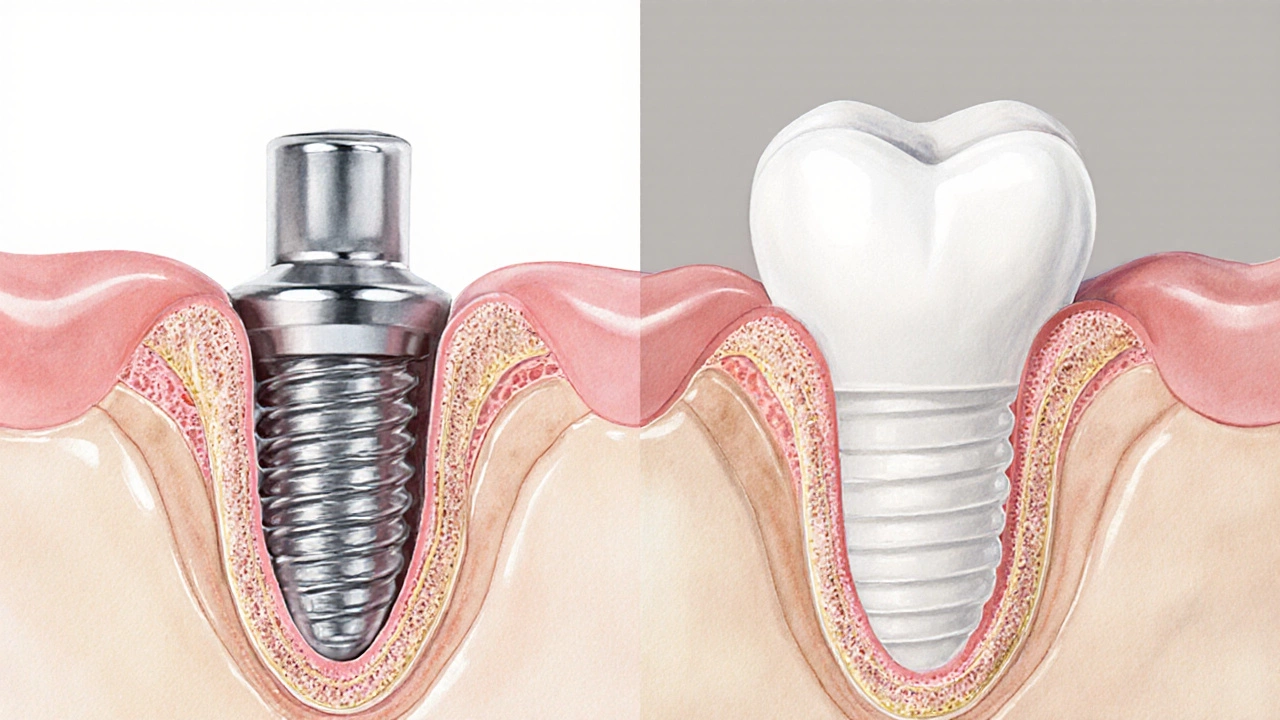 Oct, 21 2025
Oct, 21 2025
Dental Implant Lifespan Estimator
How long will your implant last?
Based on UK clinical data and your lifestyle factors
Your Estimated Implant Lifespan
Key Factors Affecting Your Lifespan
Ever wondered if a dental implant is a lifetime fix or a temporary patch? The short answer is: most implants can last decades, but several factors decide whether they truly stand the test of time. In this guide we’ll break down the science behind implant longevity, the everyday habits that help or hurt them, and what you can expect if you ever need a replacement.
What Is a Dental Implant?
Dental implant is a prosthetic tooth root made of biocompatible material, surgically placed into the jawbone to support a crown, bridge or denture. It’s also called a tooth implant and has become the go‑to solution for missing teeth across the UK.
Typical Lifespan Numbers
Clinical studies from the British Association of Oral Surgeons report an average success rate of 95‑98% after ten years. Real‑world data from UK private clinics shows that dental implants last an average of 20‑25 years when patients follow proper care routines. Some implants survive 30 + years; others may fail earlier due to complications.
Key Factors That Influence How Long an Implant Stays Healthy
- Material choice - Titanium and zirconia are the two main alloys. Each has different wear‑resistance and bone‑integration properties.
- Osseointegration quality - The bond between bone and implant surface determines stability. Poor bone density or early loading can weaken this link.
- Oral hygiene - Plaque buildup around the abutment can lead to peri‑implantitis, the biggest threat to longevity.
- Smoking - Nicotine reduces blood flow, impairing healing and increasing failure risk by up to 30%.
- Systemic health - Diabetes, osteoporosis, and certain medications can affect bone remodeling.
- Professional maintenance - Regular check‑ups allow early detection of loosening or bone loss.
Material Comparison: Titanium vs. Zirconia
| Attribute | Titanium | Zirconia |
|---|---|---|
| Biocompatibility | Excellent - widely used for 50+ years | Excellent - metal‑free, ideal for metal‑allergic patients |
| Osseointegration speed | Rapid - strong bone bonding within weeks | Good - slightly slower than titanium |
| Strength | High tensile strength, resistant to fracture | High compressive strength, brittle under extreme load |
| Aesthetic outcome | Metal shine may show through thin gums | White ceramic mimics natural tooth color |
| Typical cost (UK) | £1,400‑£2,200 per implant | £1,800‑£2,600 per implant |
| Average lifespan | 20‑30 years with good care | 15‑25 years (long‑term data still emerging) |

Understanding Osseointegration and Its Role in Longevity
Osseointegration is the process where bone cells grow onto the surface of the implant, forming a stable, load‑bearing connection. Successful osseointegration usually occurs within 3‑6 months for titanium and slightly longer for zirconia. Factors that support it include:
- Adequate bone volume - sometimes requiring a bone graft to rebuild missing bone
- Controlled chewing forces during the healing phase
- Absence of infection or inflammation around the surgical site
Daily Habits That Extend Implant Life
- Brush twice daily with a soft‑bristle toothbrush and fluoride toothpaste. Pay extra attention to the gum line around the abutment.
- Floss or use an interdental brush at least once a day to remove plaque from hard‑to‑reach spots.
- Rinse with an antibacterial mouthwash (chlorhexidine) once a week for a short period, especially after smoking or heavy meals.
- Visit your dentist or implant specialist every six months for a professional cleaning and radiographic check‑up.
- Avoid biting hard objects (ice, pens) that could stress the implant crown.
- Quit smoking - even cutting back to a few cigarettes a day can improve healing.
- Maintain a balanced diet rich in calcium and vitamin D to support bone health.
When Implants Start to Fail - Warning Signs
Even the best‑placed implant can develop issues over time. Keep an eye out for:
- Persistent swelling, redness, or bleeding around the implant site.
- Unusual mobility or a clicking feeling when chewing.
- Bad taste or foul odor, indicating infection.
- Radiographic evidence of bone loss greater than 0.5 mm per year.
If you notice any of these, book an appointment promptly. Early intervention-often involving deep cleaning or minor bone grafting-can rescue an otherwise salvageable implant.

Cost of Replacing a Failed Implant in the UK
Replacement costs vary based on material, need for additional surgery, and whether you use NHS or private care. Rough figures:
- NHS pathway - £350‑£800 for the surgical component, plus any required bone grafts.
- Private clinic - £1,400‑£2,500 for the implant fixture, plus £300‑£600 for the crown.
- Additional fees for imaging, sedation, and post‑op follow‑up can add £200‑£500.
Many UK dental insurance plans cover a portion of these expenses, but checking policy specifics is essential.
Real‑World Longevity: Patient Stories from the UK
Sarah, a 58‑year‑old teacher from Manchester, received a titanium implant in 2005. With diligent oral care and bi‑annual check‑ups, her implant is still thriving in 2025-30 years later. In contrast, James, a 45‑year‑old smoker from Liverpool, had his first implant placed in 2013. By 2020 he experienced peri‑implantitis, requiring removal and a new zirconia implant. His experience highlights how lifestyle choices can shave years off an otherwise durable restoration.
Quick Checklist: Is Your Implant on Track?
- Do you brush and floss daily around the implant?
- Do you see your dentist every 6‑12 months?
- Are you a non‑smoker or have you reduced smoking?
- Is there any swelling, pain, or mobility?
If you answered “yes” to the first three and “no” to the last, you’re likely on the right path for a long‑lasting implant.
Bottom Line
Dental implants can easily outlive many other dental restorations, often reaching 20‑30 years with proper care. Material selection, bone health, oral hygiene, and lifestyle choices are the biggest levers you can pull to extend that timeline. Regular professional monitoring acts as an early warning system, letting you address issues before they become costly failures.
How long do dental implants typically last?
With good oral hygiene and regular dental visits, most implants survive 20‑25 years, and many reach 30 years or more.
Does the type of material affect lifespan?
Yes. Titanium has a longer track record and slightly higher long‑term survival rates. Zirconia offers better aesthetics and is suitable for patients with metal sensitivities, but long‑term data is still catching up.
Can smoking shorten an implant’s life?
Smoking reduces blood flow, impairing healing and increasing failure risk by up to 30 %. Quitting or cutting back significantly improves longevity.
What is peri‑implantitis?
Peri‑implantitis is an inflammatory condition affecting the gum and bone around an implant. If untreated, it can cause bone loss and eventual implant failure. Early signs include redness, swelling, and bleeding on probing.
How often should I see my dentist about my implant?
At least once every six months for a professional cleaning and a quick radiographic check‑up. If you have risk factors like diabetes or a history of gum disease, semi‑annual visits are advisable.
